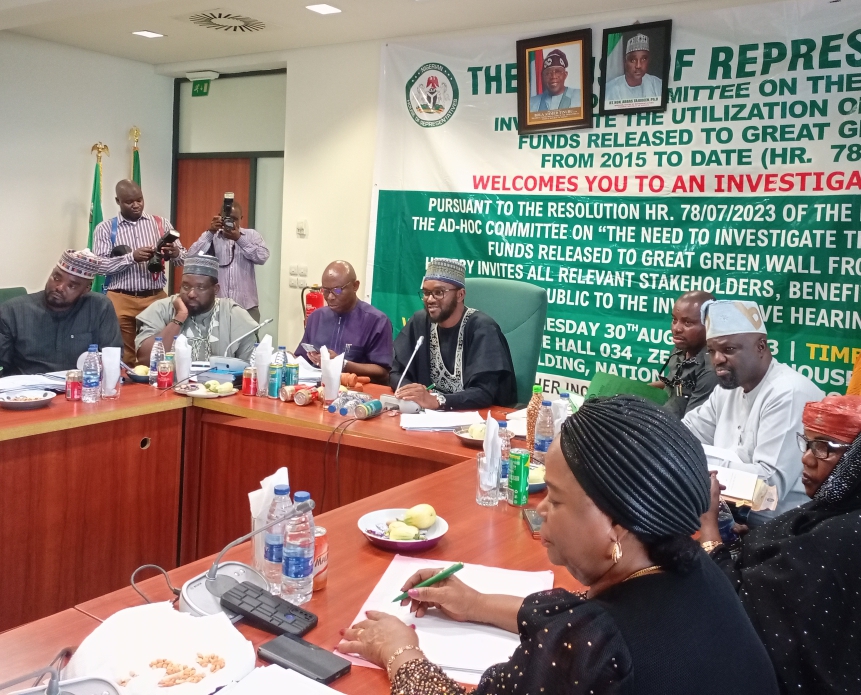The Nigerian House of Representatives says it is poised to uncover challenges facing the implementation of the Great Green Wall Programme.
The Speaker of the House, Tajudeen Abass stated this while declaring open an investigative hearing on the Utilization of Ecological Funds Released to the Great Green Wall, in Abuja.
He said that “the House would expose corruption and identify challenges affecting the execution of the Great Green Wall (GGW) and also guide the new administration in the continued implementation of the policy.”
The Speaker also said that the investigation was coming at a time of heightened public expectations, given the experiences with the management of public funds by agencies of government in recent times, which was threatening the development of Nigeria.

Abbas noted that the importance of the Great Green Wall project cannot be over-emphasised especially given the security problem facing the nation in the last two decades.
He said, however, information emanating from the field does not seem to reflect an optimal implementation of this noble programme despite the numerous funds available for its implementation.
Worried by the development, the Speaker said that ” the 10th Parliament deliberated on the issue and resolved to set up an ad hoc committee to investigate corruption and identify challenges affecting its execution. The Committee will investigate;
“All funds received from International organizations or Donor agencies from 2015 to date; All budgetary and other Federal allocations to the National Agency for the Great Green Wall from 2015 to date: the utilization of ecological funds released to the Great Green Wall by the international organizations; All contracts awarded to various contractors for the project from 2015 to date; and the total sum received through the policy and the level of compliance with the goals and objectives of the projects.”
The Speaker assured the stakeholders that the investigative hearing was not for persecution or score-settling, adding that “the parliament is only exercising its mandate as provided for by the 1999 Constitution, as amended.”
The Ad hoc Committee Chairman, Isma’ila Dabo, said in recent years, the country has witnessed a significant upsurge in natural environmental challenges such as land degradation, deforestation, desertification, and drought.

He noted that projects such as the GGW under investigation were designed primarily to address some of these issues.
Dabo said that the persistence of these challenges despite funds put into the programme from both the Federal Government and international partners has necessitated the investigation.
He stressed that the investigation was to provide fair hearings to all parties and for all issues affecting the successful implementation of the project to be brought to the table.
“As a Committee, our assignment is to investigate and make appropriate
recommendations to the House for a resolution, and we will do just that.
This hearing is to provide fair hearings to all parties and for all issues affecting a successful implementation of the project to be brought to the table. After this hearing, we shall embark on, an on-the-spot assessment tour of all the projects executed under this scheme to ascertain the claims.
“The Ad-hoc committee is resolute in undertaking this assignment in the
interest of all Nigerians. We are not here to scandalize any individual or
organization but only to ensure that public funds are utilised for the purpose they are meant for. We will not shy away from pointing fingers where necessary, not out of personal animosity but simply in the national interest of our nation” Dabo said.
He used the opportunity to express the Committee’s displeasure with some Ministries, Departments, and Agencies of the Nigerian Government as well as several state governments, saying “they have either not responded to our request to submit the necessary documents required, or deliberately delayed such documents to do so this week to help the Committee have a proper diagnosis of issues under context.”
The National Agency of the Great Green Wall was established by an Act of parliament in 2015 to implement the Nigerian component of the Great Green Wall program, which is an initiative of the African Union (AU) to address the problems of Land degradation, Desertification, Drought, Climate Change, and Livelihood of affected communities in eleven frontline states in the North East and North West regions sharing borderlines with some countries including but not limited to Niger, Chad, and Cameroon to mention but a few.
The Central Bank of Nigeria, Office of the Great Green Wall, and Ecological Fund Office appeared before the committee to give an account of their activities in the Green Green Wall.
VON




You must be logged in to post a comment.